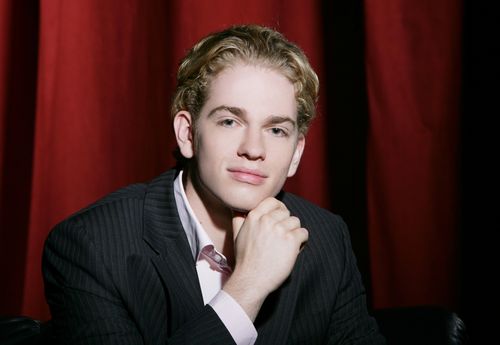Pianist Moog offers a keyboard night at the opera

Joseph Moog performed Saturday night at the Miami International Piano Festival.
It’s a rare piano recital that prominently features the music of Wagner and Verdi.
But the two masters of 19th-century opera, both marking anniversary years, made a major appearance Saturday night in Miami Beach in the program of Joseph Moog. The young German pianist offered virtuoso keyboard fantasies on their music and clearly had the technique to deliver these works with accuracy and style.
Moog, 25, has performed widely in Europe and recorded works of Liszt, Scarlatti, Rubinstein and others. His recital came as part of the Miami International Piano Festival, being held this year at the Colony Theater.
Wagner’s Ride of the Valkyries, as arranged for piano by Liszt’s pupil Carl Tausig, was a display of virtuosity as spectacular visually as it was to the ear. Moog thundered the melody in the bass with his left hand, as his right hand flew across the keyboard in the complex accompaniment, booming away at the music in a manner that provided a credible substitute for the forces of a Wagnerian orchestra.
Isolde’s Tod, as arranged by the 19th century German virtuoso Moritz Moszkowski, turned out to be less successful. It would be beyond the powers of any pianist to recreate the warmth of Wagner’s orchestration, and Moog here delivered another bravura performance, smoothly executing the intricate arpeggios and runs that accompanied the melody. Yet the performance remained earthbound and matter-of-fact, too percussive in the opening, lacking the sensuousness of the original and with a climax that felt underheated.
A third Wagner work was a novelty, a short piano piece written by the composer called Arrival of the Black Swans, in which Moog played the central melody with Chopin-like phrasing.
Verdi appeared in the form of three arrangements by Liszt of passages from the operas Rigoletto, Il Trovatore and Ernani. Moog easily conquered all the usual Lisztian hurdles— double octaves at breakneck speed, cadenza-like runs the length of the keyboard. But what was most impressive were the soft filigrees of notes that decorated the melodies, brought off by the pianist with an even tone and feather-light touch.
Run-of-the-mill cell phone violations in South Florida during concerts aren’t surprising at this late date. But a new departure took place during the Verdi, when a woman’s phone went off and she walked to a corridor and put the phone on speaker, filling the hall with raspy, metallic sound until an usher rushed over and put an end to it.
Musically the most interesting work on the program was Debussy’s Trois Images Oubliées, a rarely performed piece from early in the composer’s career. With a delicate but sure touch, Moog brought out the wistful, misty tone of the melodies, with pealing chords in the “Souvenir du Louvre” section and frictionless high-speed notes in the final section.
The recital opened with Haydn’s Sonata in D Major, Hob: XVI: 24, which Moog performed smoothly and expertly, although the last movement in particular came off flat, without the high spirits, wit and energy called for in the music. Mozart’s brief Fantasy in D Minor was performed with a tone of taut, controlled tension and operatic drama.
As an encore, Moog performed an arrangement of Rachmaninoff’s song The Little Island by the late American piano virtuoso Earl Wild, a work that was similar in texture to the Verdi arrangements, brought off with more light embroideries of notes.
The Miami International Piano Festival continues 3 p.m. Sunday at the Colony Theater in Miami Beach with Kemal Gekic. 305-935-5115; miamipianofest.com.
Posted in Performances
Leave a Comment
Sun May 19, 2013
at 1:51 pm
No Comments




